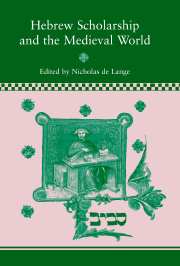Book contents
- Frontmatter
- Contents
- The contributors
- Preface
- List of abbreviations
- PART ONE NEW LINES OF INVESTIGATION
- PART TWO THE HEBREW LANGUAGE
- PART THREE PRAYER AND POETRY
- 8 The origin of the Qaddish
- 9 The journey inward: Yehuda Halevi between Christians and Muslims in Spain, Egypt and Palestine
- 10 Abraham ibn Ezra as a harbinger of changes in secular Hebrew poetry
- 11 O Seville! Ah Castile! Spanish Hebrew dirges from the fifteenth century
- 12 On translating medieval Hebrew poetry
- PART FOUR THE WORLD OUTSIDE
- Bibliography of the writings of Raphael Loewe
- Index of names
10 - Abraham ibn Ezra as a harbinger of changes in secular Hebrew poetry
Published online by Cambridge University Press: 21 January 2010
- Frontmatter
- Contents
- The contributors
- Preface
- List of abbreviations
- PART ONE NEW LINES OF INVESTIGATION
- PART TWO THE HEBREW LANGUAGE
- PART THREE PRAYER AND POETRY
- 8 The origin of the Qaddish
- 9 The journey inward: Yehuda Halevi between Christians and Muslims in Spain, Egypt and Palestine
- 10 Abraham ibn Ezra as a harbinger of changes in secular Hebrew poetry
- 11 O Seville! Ah Castile! Spanish Hebrew dirges from the fifteenth century
- 12 On translating medieval Hebrew poetry
- PART FOUR THE WORLD OUTSIDE
- Bibliography of the writings of Raphael Loewe
- Index of names
Summary
Abraham ibn Ezra, one of the foremost Jewish scholars in twelfthcentury Spain, the author of many books on philosophy, biblical commentary, astronomy, Hebrew grammar and mathematics, was also one of the famous Hebrew poets of the Middle Ages. He wrote hundreds of liturgical poems, piyyutim, which are still included even today in synagogue rituals, and about 250 secular poems. On the one hand, his poetical work is a beautiful representation of the traditional Andalusian school, prosodically as well as thematically. On the other hand, one may easily identify in his work new poetical tendencies which should be considered as the precursors of a new period in the history of Hebrew poetry.
Unlike his liturgical poetry, his biblical commentaries or his linguistic researches, Ibn Ezra's secular poetry has been relatively neglected by contemporary scholars. His secular poems have been published in three editions, all three dating from the nineteenth century: Eiger's edition, based mainly on Berlin manuscript 186, a unique copy of a Yemenite diwan from the fourteenth century; Rosin's edition, Reime und Gedichte des Abraham ibn Ezra, and Kahana's edition, which is problematical, especially on questions of attribution and identification. All three naturally appeared too early to make use of the Genizah materials; all three are partial and very old fashioned in their modes of presentation. Nevertheless, those are the only complete editions available to the modern reader.
Selections of Ibn Ezra's secular poems have been presented in H. Schirmann's famous anthology, Ha-Shira ha-Ivrit bi-Sefarad u-vi-Provans and later in Israel Levin's Yalkut Avraham ibn Ezra. Nevertheless, even in those anthologies the editors follow the work of previous scholars, without studying either new sources or problems of attribution.
- Type
- Chapter
- Information
- Hebrew Scholarship and the Medieval World , pp. 149 - 155Publisher: Cambridge University PressPrint publication year: 2001



